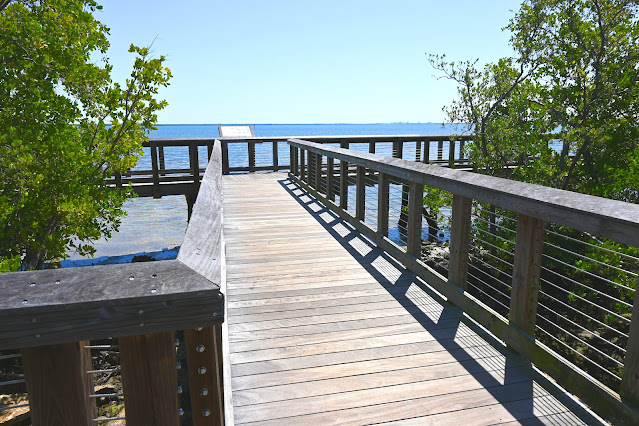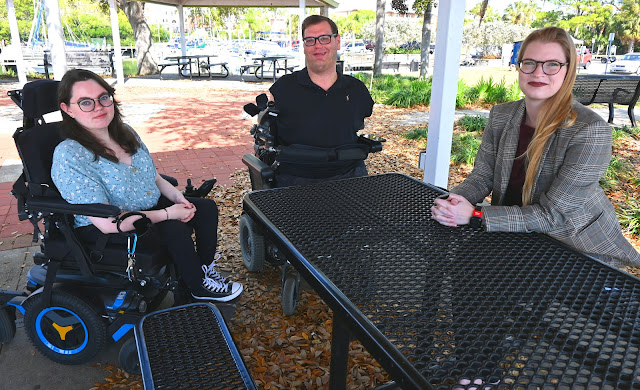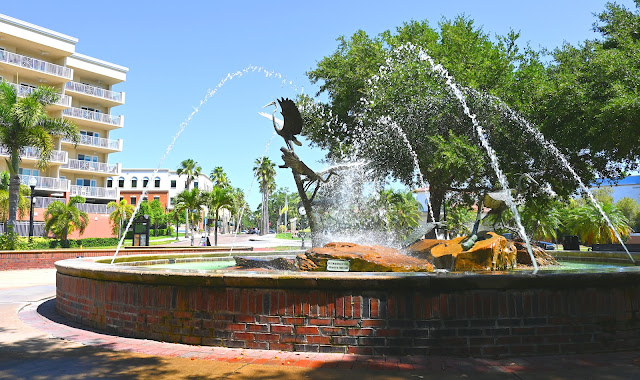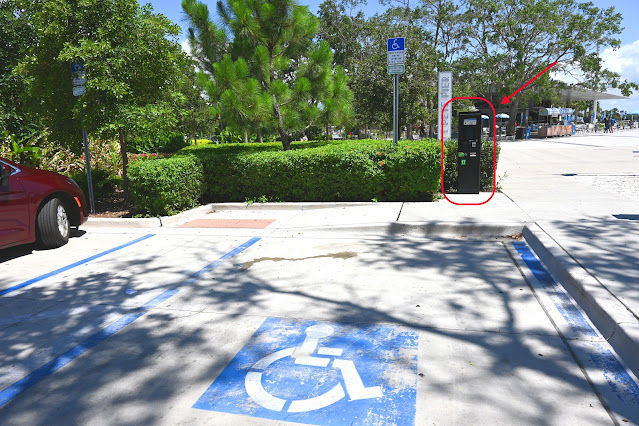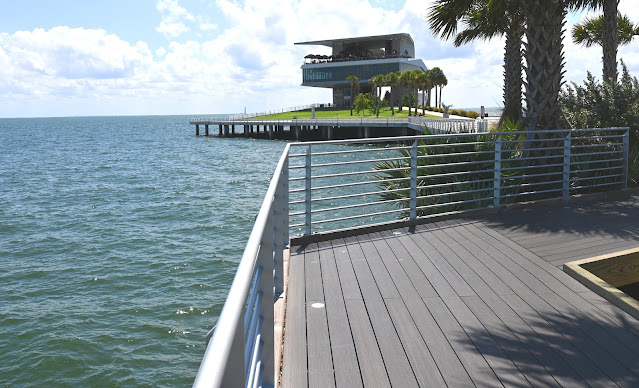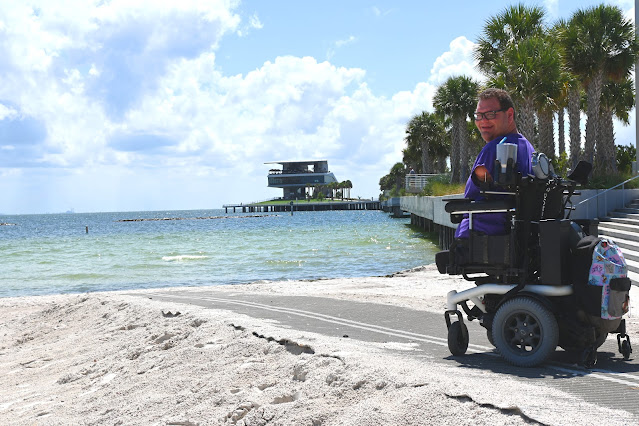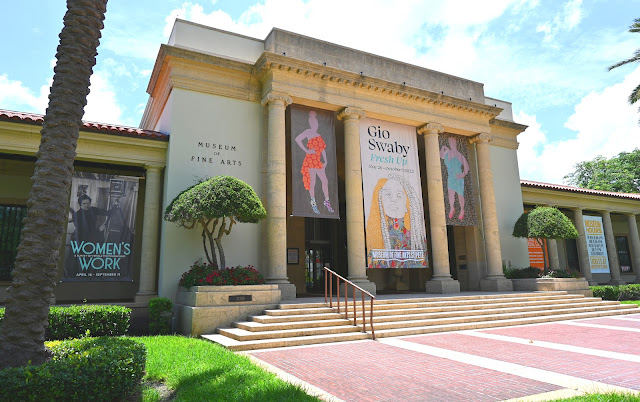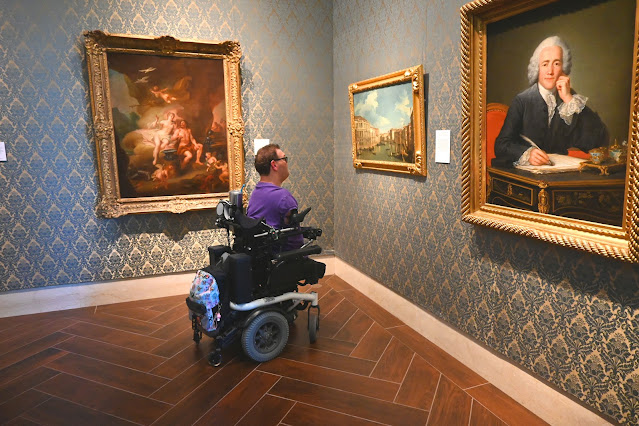Accessibility Grade: A
If you're a native Floridian, you know that summer time is beach season. But when you're a wheelchair user, you also know that sand is the arch nemesis of both manual and power wheelchairs. So how can you get that taste of Florida summer, in a way that won't ruin your wheelchair's bearings and/or motors? One work around is to find an accessible, public park, much like the Safety Harbor Waterfront Park.
While there are a few entrances, all of the sidewalks are at least wide enough to accommodate a power wheelchair user. Many of the pathways are extra wide and smooth, like the one shown in the picture above. There is a sign to the left of the sidewalk, which is prominently displayed and reads "Welcome to Waterfront Park." The letters are in white and yellow, with a black background, making them easier to see for people with low vision. From time to time, there are metal posts that crop up, which have lights located at the top. If you are blind or have low vision, try to be careful in this area. It may be a good idea to walk more towards the middle of the sidewalk. Wheelchair users may want to do the same, since there isn't enough room for most of us to fit on the outer side of these posts. That is, unless we do a bit off-roading, which isn't a great idea.
Continuing along this path, you'll come to a boardwalk. This area is great for wheelchair users, as well as people with varying kinds of mobility disabilities, because it offers a unique opportunity. In addition to a scenic view of the ocean, the boardwalk also winds around and through the mangroves. In this picture, the boardwalk moves forward and wraps around the mangroves, which are to the right. There are wooden handrails and guards that extend its entire length. On the left is the ocean, plus a sign that describes some aquatic wildlife that can be found in the area.Driving over the boardwalk in my power wheelchair, I noticed that the surface was much smoother than I expected. That was great for me, because it meant that my wheelchair wasn't jostling around, which also meant that the water from my travel cup didn't spill all over me. While I'm joking, but only slightly, this feature is very important for individuals who have less trunk or neck control. When enjoying the summer weather, the last thing that any wheelchair user wants to experience is an unnecessarily bumpy ride. This image shows a section of boardwalk, which cuts between two mangrove growths. In the distance, the ocean is viewable. The path leads to the left and the right, both of which are obscured by the mangroves.
After exiting the boardwalk and continuing down a wide sidewalk, you'll make your way towards the Safety Harbor Marina and Pier. Along the way, there are large sections of grass. In this picture, Sydney is driving her power wheelchair alongside Dawson, who is a cane user. It's clear that there is plenty of room for them both. In fact, there may be enough room for another wheelchair user.
At the end of this path is a large, paved section. It is both covered and has picnic tables. This space has plenty of room for wheelchair users, and is easy to navigate. In this image, the covered seating area is in the distance and to the right. It looks like the top of a tent, and is made of multiple sections of cloth, all of which are yellow. If you continue to the right, you will reach the boat ramp and marina's parking lot, and another small section of park. Beyond this section is the pier, but we'll save that for the final section of this review.
The boat ramp and harbor have a large parking lot, which has about six accessible parking spaces. There is no fee to park here, and is right across from Main Street, which also has a number of shops and restaurants. Since the odds of finding an accessible spot are pretty high, and because this lot is pretty central to everything in the area, parking here is often a good idea. This picture shows a few, accessible parking spots.Continue towards Main Street, and you'll pass a circular, shaded area. It has a number of benches, and also boasts a beautiful fountain at the center. There are five streams of water that shoot from the outer part of the fountain, towards its middle. The water falls on a number of rock structures, which contain sculptures of a few different species of semi-aquatic birds, in various poses. It is certainly a beautiful landmark, which could be considered a focal point of the park.



